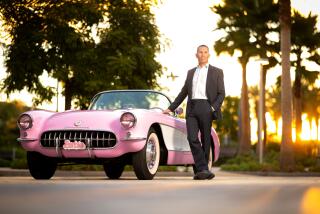Thomas the Tank Engine turns to an unlikely friend for script help: the United Nations
- Share via
On a recent weekday afternoon, a corporate executive met with staffers at the United Nations’ landmark building in New York, high above the East River.
The executive wasn’t an energy or environmental mogul looking for a government contract. She was a senior marketing manager for Thomas the Tank Engine, Mattel Inc.’s musty toy brand about a railcar that speaks. And the U.N. staffers, in person and Skyped in from around the globe, were there for an unusual purpose: to vet “Thomas” content for its U.N.-worthiness.
“So, what do you think?” said the manager, Megan Pashel, after playing a clip from a laptop in New York.
“I thought it was excellent — I was really impressed with the representation of gender equality,” said Tolulope Lewis-Tamoka, Africa program advisor for U.N. Women, speaking from Nairobi, Kenya. “I think this will make a strong impression on boys and girls. And it has gender-sensitive language, which is what U.N. Women really stands for.”
For more than 70 years, young children have been told stories about the mischievous Thomas and his track-bound pals, originally in a British book series and, for much of the last three decades, in a TV show titled “Thomas & Friends.”
But viewership and merchandise sales have been sharply declining in recent years. So in what principals from both sides say is a first, Mattel has called on the United Nations to help, hoping that an appetite for inclusive characters and “woke” messages will make the property more appealing to modern children and their parents.
Mattel and the United Nations have been engaged in an 18-month collaboration that has the diplomatic body helping shape story lines and characters on the cable television series, now titled “Thomas & Friends: Big World! Big Adventures!” When the new-look show launches Friday on Nick Jr., on display will be not just a fresh direction for a toy brand, but also a trial balloon of sorts for a new — and, to some, thorny — form of entertainment, one in which global activism and commercial Hollywood are entwined.
“We think this can be a whole new way of collaborating,” Richard Dickson, president and chief operating officer of Mattel, said in an interview. “We hope partnerships like this become an example for others.”
The arrangement began when Mattel executives in early 2017 approached the United Nations and said they would like to work together. Soon teams from Mattel and the United Nations were gathered in New York, where U.N. staffers pitched ideas to Thomas brand managers. The parties were trying to figure out which of the United Nations’ Sustainable Development Goals — the 17 objectives in areas such as poverty, hunger and sanitation it aims to achieve by 2030 — would make sense for story lines.
They eventually settled on six. Five of them — education, sustainable communities, responsible consumption, gender equity and “life on land,” about healthy ecosystems — will be featured in a total of nine of the 26 episodes and related short-form content this season. (A sixth goal, related to clean water, was accepted, but wound up on the cutting-room floor because it could not be worked in easily.)
To address gender equality, for instance, producers replaced several male characters with female ones, including an orange car named Rebecca, an African car named Nia and a Chinese engine named Hong-Mei, and worked messages about gender into the episodes.
“Some think girls are weak, but I know that’s not true,” Thomas says in one piece of content soon after he is bested in a race — and rescued — by Hong-Mei.
“Gordon can pull the engine, and Rebecca can pull the engine,” he adds. “If boys and girls aren’t given the same opportunities, they might not be given the chance to work as equals, and that’s not fair.”
The U.N. involvement in the episodes took multiple forms — correcting language such as Thomas’ use of “forest” when he meant “orchard,” or helping to craft a plot point in which a forest fire results in a bird with a potato chip bag on its head. (It conveys the importance of recycling.) In other episodes, Thomas, leaving the fictional island of Sodor for the first time, travels to new places to learn lessons about the environment and school that he did not know back home.
The United Nations is not mentioned in the episodes; the Sustainable Development Goals — or SDGs, as they are known — are alluded to only in the credits.
For the global body, the hope is that putting the messages in an entertainment context will help them reach people in ways bureaucratic programs cannot.
“We felt strongly that we’d have more impact working on content,” said Jeffrey Brez, the U.N. chief of nongovernmental-organization relations and advocacy, who helped spearhead the project. “Thomas is a global franchise in a larger number of countries and languages. They can do things we can’t. Our outreach capacity is very limited.”
Brez, whose job description includes working with entertainment brands to further U.N. objectives, said: “We don’t necessarily always want to tell the world about the U.N. — sometimes we just want them to know about SDGs.”
Bringing together a commercial toy giant and a global altruistic organization has in the past led to some friction. A more limited partnership between the United Nations and Warner Bros., for instance, ended abruptly in late 2016 shortly after the United Nations had named Wonder Woman as an honorary ambassador for women. U.N. staffers protested the announcement, saying the character did not represent the organization’s feminist ideals. The partnership was ended after just a few months.
Brez noted there was a period of cultural adjustment between the two parties on “Thomas.” He stressed that none of his team members were writers and that they were there simply to explain the development goals so the show’s creators could move them forward. “Because if it doesn’t work for the story, no one’s going to watch it,” he said.
Lewis-Tamoka said there was a lot of compromise that had to happen on the language.
“Nia can’t go back home, because she was displaced,” she said of one plot point. “We have a particular way of saying that — she’s a migrant refugee — and they don’t use those words.”
Ian McCue, a longtime producer and writer on “Thomas,” said he was not certain the pact could work.
“For us, this was quite daunting, because in the back of our minds we’re thinking, ‘This is a show for preschoolers, for 3-to-5-year-olds,” he said. “So with some of this messaging, we will have to be careful about how we come across. But we started thinking really hard about which of these 17 Sustainable Development Goals would work for ‘Thomas,’ and we finally felt we ended up with five that worked for us.”
He said goals such as sustainable cities made sense as Thomas and his pals took trips to new places, while responsible consumption fit because recycling and trains were a natural. “Life on land” was worked in via an animal park on Sodor.
For Mattel, of course, the aim is not just a more responsible citizenry, but higher sales.
“Over the last several years, the brand has lost its way,” Dickson said. Thomas, he noted, “suffered setbacks against a rapidly changing preschool landscape.”
These messages, he said, could change that. “It’s not dissimilar to how we needed to change the conversation around Barbie,” alluding to the decision to include more body types and racial inclusion after sales of the doll fell. The addition of female engines is a clear bet that the brand, which skews male, can attract more girls.
“I’ve always believed legacy brands can thrive when they’re under tension,” Dickson said, “and when you look at Thomas from a business perspective, it’s been under tension. Tension can provide breakthroughs.”
Whether the makeover will provide that sales jolt remains to be seen. Barbie sales rose 24% earlier this year thanks to the new set of dolls and a message of female empowerment. But Barbie was a better-known brand and, as a property that dealt explicitly with body image, seemed in need of a 21st century makeover. A set of talking trains is a less obvious candidate.
Mattel certainly needs the brand reinvention to work. The El Segundo company reported a loss of $240 million for the recent quarter, spurring a decision to cut more than 2,000 jobs. Its stock price has lost more than 50% in the last two years, while larger changes in the toy business, such as the liquidation of Toys R Us, have made the climate harsh.
Thomas has been a key factor in those challenges, with sales dropping 8% in the most recent quarter.
The character’s turn to the United Nations has not been welcomed by all. Some on the right say the new direction is a bone thrown to the left and politicizes a toy and its preschool audience.
“Goodbye Thomas the Tank Engine — and hello to Thomas the Politically Correct Outreach Officer for the United Nations,” wrote the British journalist Quentin Letts in a sarcastic column in the Daily Mail, adding that the partnership was “enough to make you blow your boilers.”
The agreement marks a step beyond where Hollywood has gone in its diversity initiatives, which have largely focused on hiring, not scripts. When it does include the latter, it tends to be with a more in-house approach, as with the story lines of “black-ish” creator Kenya Barris, who has tackled topical issues because he says he feels they are important. Enlisting organizations in development is rarer.
But those behind Thomas say this is not a matter of outsourcing Hollywood’s creative process. It is, they say, simply a question of having characters exist in the modern world.
“If you look at Thomas, the property has always been changing,” McCue said. “It was the books in the ‘40s and TV series in the ‘80s and then with CG in the ‘90s. This is just another change we needed to make.”
Zeitchik writes for the Washington Post.
More to Read
Inside the business of entertainment
The Wide Shot brings you news, analysis and insights on everything from streaming wars to production — and what it all means for the future.
You may occasionally receive promotional content from the Los Angeles Times.











